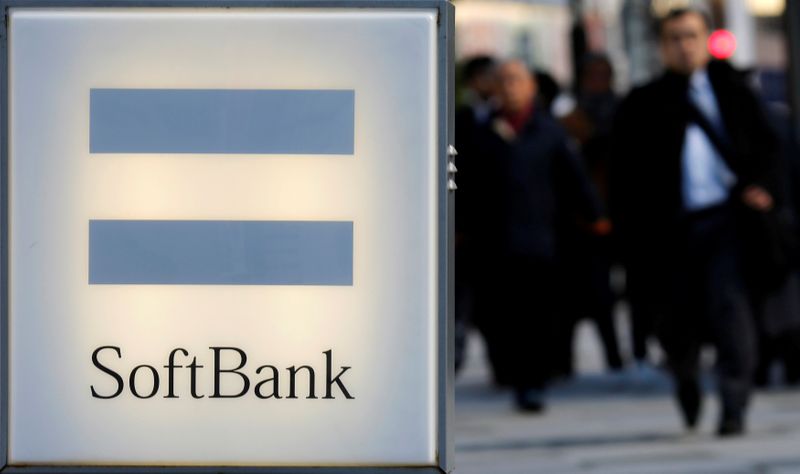By Saeed Azhar, Anirban Sen and Davide Barbuscia
(Reuters) - SoftBank Group Corp (T:9984) has pumped $2.5 billion of its own cash into new investments since October, people familiar with the matter said, hoping to restore its money-making credentials as it courts investors for a successor to its Vision Fund.
The Japanese technology conglomerate is also considering investing another $2.5 billion of its own money, one of the people said.
SoftBank Chief Executive Masayoshi Son said last week the company may spend up to two years investing its own money in a bridge fund, to build a portfolio that will give investors enough confidence to participate in a second Vision Fund. To that end, he said SoftBank has already invested "billions" of U.S. dollars, but he did not provide an exact figure.
SoftBank was targeting a $108 billion fundraise for the second Vision Fund, and had committed $38 billion of its own money toward that goal. However, Son said last week its launch had been delayed due to investor "concerns" about the performance of the first $100 billion Vision Fund.
The pace of SoftBank's latest investments contrasts markedly with that of the first Vision Fund, which spent over $80 billion after its first major fundraising close in May 2017.
The fund's investment spree drove a rally in the valuations of a number of technology start-ups, such as office space-sharing company WeWork and ride-hailing firm Uber Technologies Inc (N:UBER). This rally fizzled out once these companies' losses mounted along with their breakneck growth.
SoftBank was forced to save WeWork from bankruptcy last year in a roughly $10 billion financing deal, while Uber's shares are trading more than 10% below the price of their initial public offering in March 2019, even after a recent rally.
Last week, SoftBank said the first Vision Fund had realized $9.5 billion in cash and mark-to-market gains as of December-end. That represents a 9.5% gain since its first major fundraising close, versus 25% in the S&P 500 Index over the same period.
BRIDGE FUND
SoftBank has made seven investments since October - including U.S. drug retailer Alto Pharmacy and Indian eyewear retailer Lenskart - and has half a dozen more in the pipeline, Rajeev Misra, a SoftBank executive who also runs the Vision Fund, said at an investment conference in Abu Dhabi last week.
Abu Dhabi's Mubadala and Saudi Arabia's Public Investment Fund (PIF) account for the bulk of the first Vision Fund at $60 billion. They have yet to commit to the second fund.
Son spoke to Mubadala executives last week to convince them that the turnaround the Vision Fund was implementing in its investment portfolio was working, said one of the people, who declined to be identified as the information was not public.
SoftBank and PIF declined to comment. A Mubadala spokesman said his company was a long-term partner of SoftBank, with which it was in regular discussion.
Bridge funds are commonly deployed by private equity and venture capital fund managers struggling with their investment track record, in order to attract investors reluctant to commit to blind pools of capital.
In 2014, loyal investors helped TPG Capital Management LP raise a $2 billion bridge fund after the buyout firm's previous $19 billion fund suffered losses in key investments. TPG rolled that bridge fund into a new $10.5 billion fund in 2016 after securing enough investor support.
In SoftBank's case, the bridge capital has come exclusively from the company itself. SoftBank has 3.8 trillion yen ($34.65 billion) in cash on hand but is currently being pressured by Elliott Management Corp to buy back shares, to boost the value of what the hedge fund considers underperforming stock.
SoftBank also has developed a hedge fund overseen by Misra, the Wall Street Journal reported earlier this month.
In July, SoftBank said investors including Microsoft Corp (O:MSFT), Apple Inc (NASDAQ:AAPL)
Seven months later, the fund has not received any money from outside investors.

Meanwhile, the first Vision Fund has invested $80.5 billion in 88 companies, SoftBank disclosed last week. While it raised over $100 billion, the fund needs to retain the remainder for potential re-investment in portfolio companies, as well as for coupon payments on outstanding debt, Son said.